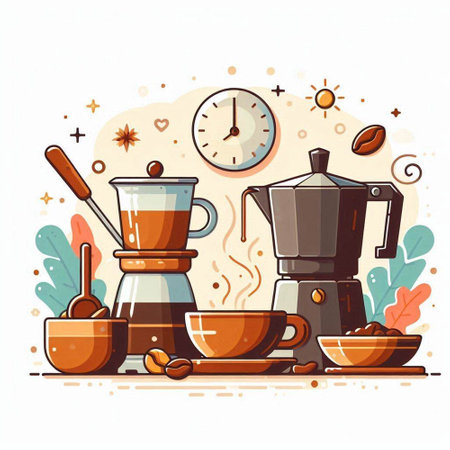The Heartbeat of Mumbai: Inside a Parsi Cafe
Step into the timeless world of Mumbai’s Parsi cafes, where history and hospitality blend seamlessly with every sip of Irani chai. The moment you cross the threshold, you are greeted by the aroma of freshly brewed tea, the soft clatter of wooden chairs on mosaic-tiled floors, and the unmistakable hum of lively conversation in a mix of Gujarati, Hindi, English, and sometimes even a dash of Marathi. These cafes—some standing since the days of British India—offer more than just a quick cup; they offer an experience that is woven into the very fabric of Mumbai’s identity.
Ambiance Rooted in Nostalgia
Look around and you’ll see checkered tablecloths lovingly worn over decades, sepia-toned portraits watching from walls, and glass jars brimming with bun maska and khari biscuits. The sunlight filters through high windows as old fans whir overhead, turning each cafe visit into a gentle pause from Mumbai’s relentless pace. It’s here that office-goers rub shoulders with students, artists sketch away in corners, and senior citizens reminisce about old Bombay over endless cups of chai.
A Melting Pot for All Walks of Life
The magic lies not just in the décor but in the spirit of inclusivity. In true Bambaiya style, everyone is welcome—whether you’re a regular asking for your “usual” or a first-time visitor seeking comfort in a plate of akuri on toast. Conversations ebb and flow across generations and communities; politics might be debated at one table while cricket scores are passionately discussed at another. The Parsi café embodies Mumbai’s heartbeat—open, diverse, always buzzing.
Irani Chai: Brewing More Than Tea
No story about these legendary spaces is complete without mentioning their signature Irani chai—a concoction that’s milky, strong, sweetened just so, poured theatrically from battered kettles into small glasses. Each sip carries whispers of tradition passed down through generations and serves as a warm invitation to linger longer. Here in these hallowed halls, time slows down just enough to savour both chai and conversation.
2. Legacy on a Plate: Food, Ritual, and Family
Step inside any of Mumbai’s old-school Parsi cafes, and you’ll be welcomed by more than just the aroma of freshly brewed Irani chai or the lively clatter of vintage ceiling fans. Here, tradition is not just spoken about—it is served on every plate. Generations of Parsi families have passed down their culinary secrets, each dish telling stories of migration, adaptation, and kinship.
Keema Pav & Berry Pulao: More Than Just Recipes
The iconic keema pav—spicy minced mutton tucked into pillowy bread—remains a breakfast staple for many Mumbaikars. Equally beloved is the berry pulao, where fragrant rice meets tart barberries and tender meat. These dishes are not just food but living links to Iran and Gujarat, brought alive with a local Mumbai twist. You’ll often find grandmothers supervising the slow-cooking keema or cousins arguing over whose berry pulao recipe is most authentic.
Parsi Culinary Traditions at a Glance
| Dish | Main Ingredients | Occasion/Ritual | Family Significance |
|---|---|---|---|
| Keema Pav | Mutton mince, masalas, pav bread | Daily breakfast or Sunday brunch | Symbolises hearty start to the day; shared over morning gossip |
| Berry Pulao | Basmati rice, barberries (zereshk), chicken/mutton, fried onions | Special occasions, celebrations | Brings families together for Sunday lunch; recipe guarded across generations |
| Prawn Patio | Prawns, tomato gravy, spices | Parsi New Year (Navroz), weddings | Marks auspicious beginnings; cooked by eldest family member |
| Lagan Nu Custard | Eggs, milk, sugar, nutmeg/cardamom | Weddings (“lagan”), festive dinners | Dessert served to guests as symbol of sweet blessings and hospitality |
The Rituals Behind Every Bite
Sitting at the mosaic-tiled tables, you’ll notice how every meal follows an unspoken script. The eldest serves first; chai is poured out with care; laughter punctuates conversations about everything from cricket to community politics. The act of sharing food—especially in these Parsi cafes—becomes an affirmation of identity and belonging. For many Parsis in Mumbai, these rituals are as nourishing as the keema or custard itself.

Chai, Conversations, and Society
Step into any Parsi cafe in Mumbai and you’ll instantly feel the pulse of the city, not through the clatter of crockery or sizzle from the kitchen, but through the hum of conversation swirling around steaming glasses of Irani chai. Here, brun maska—those crusty bread buns slathered with salty butter—finds its match not just with sweet milky tea, but with the stories and debates that fill every table. From old timers with silver hair and twinkling eyes, reminiscing about the Bombay of yesteryears, to college students clutching tattered notebooks and office-goers escaping the bustle for a quick snack, everyone finds common ground at these marble-topped tables.
The Social Glue of Chai
Irani chai in a Parsi cafe is more than a beverage; it’s social currency. Sipping slowly from small glasses, patrons linger for hours. The thick sweetness of the chai seems to dissolve barriers—language, age, and background become irrelevant as laughter, gossip, and friendly banter take over. It’s not uncommon to see a retired professor discussing cricket scores with an autorickshaw driver or a group of students getting political updates from an elderly regular who has seen generations come and go.
Cricket Scores & Political Debates
No other place in Mumbai offers such unfiltered access to city life. The latest cricket match is dissected ball-by-ball by self-declared experts. Politics—local and national—is hotly debated, sometimes punctuated by dramatic hand gestures or good-natured ribbing in Bambaiya Hindi and Gujarati. Everyone gets their turn to speak; nobody leaves unheard. The Parsi cafe becomes both Parliament and stadium—a true microcosm of Mumbai’s democratic spirit.
Intergenerational Storytelling
Perhaps the most magical aspect of these cafes is how stories are passed down like cherished heirlooms. The elderly recall Partition-era journeys over plates of akuri on toast, while young people listen wide-eyed between bites of bun maska. Every object—the faded family photos on the walls, the antique cash register—sparks memories and tales that transcend time. In this way, Parsi cafes continue to shape Mumbai’s social fabric: one cup of chai, one story at a time.
4. Politics in a Porcelain Cup
Step inside any of Mumbai’s legendary Parsi cafes and you’ll quickly sense that the worn marble tables and whirring ceiling fans have witnessed more than just the passing of time. These cafes are not mere eateries; they have been living rooms for a city’s political awakening and ongoing democratic dialogues. In a culture where chai is not just a beverage but an invitation to conversation, it is no surprise that many of Mumbai’s key political moments have brewed alongside the aroma of Irani chai.
Parsi Cafes: Silent Witnesses to History
During the freedom movement, Parsi cafes became discreet meeting points for journalists, activists, and thinkers. With their neutral hospitality and bustling yet private atmosphere, these venues offered relative anonymity amid colonial surveillance. Even post-independence, local leaders, trade unionists, and students would gather around chipped porcelain cups to debate policies or plan rallies.
Chai Breaks: The Unofficial Parliament
The tradition continues today. Whether it is discussing election results or dissecting cricket politics, Parsi cafes remain informal parliaments where opinions flow as freely as cutting chai. The daily ritual of chai breaks brings together people across castes and classes—an egalitarian space rare in urban India. Here’s how typical chai conversations might shape up:
Table No. |
Participants |
Topic of Discussion |
|---|---|---|
| 1 | Old timers & college students | Mumbai municipal policies |
| 2 | Taxi drivers & journalists | Civic protests & strikes |
| 3 | Parsi elders & expats | Nostalgia & changing cityscape |
| 4 | Shopkeepers & lawyers | Laws affecting small businesses |
Chai Sips & Democracy: A Local Perspective
In Mumbai’s political landscape, even a simple “Ek cup strong chai dena” can be the spark for spirited debates. Chai breaks in Parsi cafes foster community engagement—often transcending language barriers with a shared love for bun maska and good conversation. This informality is at the heart of Indian democracy, making every patron both audience and participant in the city’s ever-evolving story.
Thus, politics in Mumbai is not confined to legislative halls or newsrooms; it thrives in the everyday exchanges that occur over steaming cups of tea. In the enduring warmth of Parsi cafes, democracy is not just debated—it is lived, one sip at a time.
5. Culture of Coexistence: Faith, Festivals & Togetherness
Step inside any old-school Parsi café in Mumbai, and you’ll instantly sense the city’s unique spirit—what locals affectionately call ‘Bhel Puri culture.’ This is where every flavour, every tradition, and every community finds a seat at the table. These Irani joints aren’t just places for brun maska and chai; they are living museums of Mumbai’s pluralistic soul. Here, the aroma of freshly baked bun mingles with laughter in Marathi, Gujarati, Hindi, English—and sometimes a smattering of Farsi.
Parsi cafés have always been more than eateries; they are melting pots that dissolve boundaries between faiths and communities. During Navroze, the Parsi New Year, the kitchen is alive with the sizzle of patrani machhi and mutton pulao. Regulars—Hindu, Muslim, Christian, Sikh—drop by to greet their favourite uncle behind the cash counter with a heartfelt “Saal Mubarak!” Just weeks later, during Eid, it’s the Parsis’ turn to join their neighbours in sampling seviyan and exchanging warm wishes over cups of cutting chai.
The walls of these cafés echo stories of togetherness: an elderly Irani uncle trading jokes with a young Catholic student; a Bohri merchant sharing newspaper headlines with a Gujarati lawyer; college kids from all walks of life scribbling poetry on marble-top tables. Festivals big and small become shared celebrations here—the Christmas tree beside a tray of mawa cakes, Ganpati modaks alongside berry pulao.
Mumbai’s Parsi cafés honour this cosmopolitan legacy daily. Their very existence upholds an unspoken contract: respect for difference, joy in each other’s celebrations, and solidarity through thick and thin. In a world that often focuses on what divides us, these cafés remind us that true Mumbaiya culture is brewed strong—with inclusivity as its main ingredient.
So whether you come for the flaky chicken puffs or linger over Irani chai during monsoon drizzles, you’re partaking in something larger—a centuries-old tradition where faiths mingle, festivals intertwine, and friendships are forged over countless cups.
6. Surviving the Modern Storm
If you walk down a bustling Mumbai lane today, youll find the city’s Parsi cafes standing as silent witnesses to a changing world. The skyline is dotted with shiny new hipster coffee shops serving cold brews and avocado toast—a far cry from bun maska and Irani chai. Yet, nestled amid all this change, these age-old cafes still buzz with life, holding on to their old-world charm while adapting just enough to survive.
Adapting Without Losing Their Soul
Parsi cafe owners are well aware that the winds of modernity are blowing strong. Some have added cappuccinos and Wi-Fi to their menu, but the essence remains untouched. The checkered tablecloths, bentwood chairs, sepia-tinted family photos on the walls—these are not just décor but living history. Many regulars—be it college kids cramming for exams or elderly uncles reading their morning Times of India—find comfort in these familiar details.
Navigating Gentrification & New Tastes
Gentrification has brought in new faces and expectations, but also a fresh wave of appreciation for authenticity. While some Mumbaikars chase after the next Instagrammable eatery, others seek refuge in the nostalgia of a piping hot cutting chai poured from battered kettles. Owners like Mr. Yazdani of Yazdani Bakery or Mrs. Meherwan of Britannia Cafe often greet curious foreigners with stories about Mumbai’s past, blending tradition with hospitality—never letting go of that distinctive warmth only found in Parsi establishments.
Politics at Play: Survival Strategies
The politics here isn’t just about elections—it’s about survival in a rapidly evolving city. Many cafes have formed local alliances, supporting each other against rising rents and real estate sharks. They update menus carefully, maybe introducing a paneer puff alongside classic mutton samosas, ensuring loyal customers still get what they love. Amidst all the hustle, one thing never changes: the ritual of sharing conversations over chai, pausing life’s rush to soak up the city’s stories.
So as Mumbai races toward tomorrow, Parsi cafes remind us that true resilience is not about resisting change completely—it’s about embracing it without losing your soul (or your perfect cup of chai). And as long as there are hearts yearning for honest food and heartfelt stories, these legendary spaces will keep their doors open—even if the world outside keeps reinventing itself.
7. Handcrafted Memories: Tales from the Counter
Step into any Parsi café in Mumbai, and you’ll find that the aroma of chai is not the only thing lingering in the air—stories float between tables, whispered over chipped Irani cups and scribbled bills. The heart of these cafés beats strongest at the counter, where owners and regulars trade memories like old coins. It’s here that Mr. Dastur, a third-generation owner of Café Excelsior, leans over with a mischievous grin to reveal the secret behind his legendary masala chai—a pinch of elaichi borrowed from his grandmother’s spice tin, never written down but passed on with pride.
At an adjacent table, Mrs. Mehta sips her evening Irani chai, recalling how her college days were punctuated by heated debates on politics and cricket, all fuelled by endless rounds of bun maska. “The best ideas,” she insists with a wink, “come only after that second cup.” Across the room, young Arjun waits for his father after school, listening to tales from Rustom Uncle about Bollywood stars who once frequented the same wooden benches. Every regular has their own ritual; for some it’s dunking khari biscuits just so, for others it’s the timing—never too early or too late—for ordering an extra helping of akuri.
The café bell rings—a familiar sound that signals not just another order but another chapter. Each clang calls out for one more memory to be made: friends squeezing onto benches for one last round before curfew, lovers scribbling poetry on napkins, old timers reminiscing about rationed sugar during wartime yet never running out of warmth. These handcrafted moments are what keep Mumbai’s Parsi cafés alive—not just as eateries, but as living archives of the city’s spirit. As dusk settles and shutters draw close, stories linger like chai stains—impossible to erase and always ready to be poured anew.


